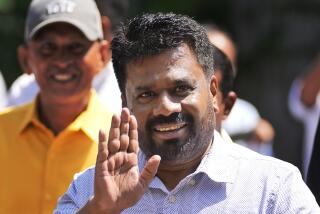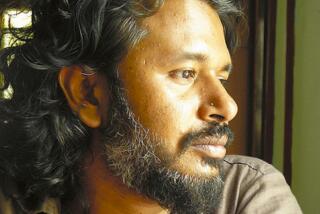Sri Lanka presidential race is a bruiser
Reporting from New Delhi and Colombo, Sri Lanka — Two months ago, when Sri Lankan President Mahinda Rajapaksa called today’s early election, the contest looked like a pushover. A few jabs for the camera at 90-pound weakling opponents, a ceremonial dance around the ring. Then the hugely popular leader would declare victory.
Instead, this has turned into a slugfest royale.
The difference has been the emergence of an unexpected challenger, fellow national hero and former army commander Sarath Fonseka, 59, who has managed to largely neutralize Rajapaksa’s trump card: credit for defeating the Tamil Tigers last year and ending Sri Lanka’s three-decade civil war.
In an even more unexpected development, the battlefield commander with limited political experience has done far better than expected. Tapping into a desire for change in the Sinhalese-majority nation, he has turned the spotlight on the economy, corruption and governance, areas where the president is more vulnerable.
“That’s what’s made it a real race,” said political analyst Jehan Perera.
And in the tradition of a good street brawl, Marquess of Queensberry rules quickly fell by the wayside.
Behind the slogan “A brighter future,” Rajapaksa has hammered away at his opponent’s lack of political experience and claimed the retired general’s supporters are stockpiling weapons and that Fonseka would bring about a military dictatorship. Former army subordinates have come out alleging that he had affairs and that he owes $17,400 in satellite phone bills.
Fonseka has slugged back at Rajapaksa, 64, alleging corruption, vote-rigging, nepotism -- several family members, including three brothers, are in the government. The newcomer has also pointed to the weak economy and has promised that if elected he would reduce presidential powers.
There are a score of other candidates, but none is viewed as a serious contender.
This has been Sri Lanka’s most violent election season in a decade, analysts said, with two bombings, four killings, 12 shootings and 137 injured included among 594 complaints received by the People’s Action for Free and Fair Elections, an independent monitoring group.
“The unfortunate choice before many voters is whether to close their nose and vote for the government or shut their eyes and vote for the opposition,” said an editorial in this week’s Sunday Times, which denounced both camps for degrading the democratic process.
For voters who don’t respond to name-calling, the candidates offer visions of wealth and glory. Fonseka, under the slogan “Believable Change,” promised every civil servant a $100 monthly salary hike in a country with per-capita annual income of about $2,000.
Rajapaksa has promised to build roads, schools and other infrastructure aimed at elevating Sri Lanka “from Third World to the First World.”
Critics accuse the president with taking advantage of government machinery. His image is on a new 1,000-rupee note, and the airwaves have been blanketed with reminders about his accomplishments, his patriotic appeal, how he’s a “son of the soil.”
The two main state-owned television channels devoted 98.5% of their news coverage to Rajapaksa, according to Reporters Without Borders, a media advocacy group.
But Fonseka has also relied heavily on imagery, including an advertisement showing him shirtless, revealing wounds suffered in a 2006 assassination attempt by Tamil Tiger rebels.
“The media played an enormous role in this campaign,” said Jeevan Thiagarajah, executive director of the Consortium of Humanitarian Agencies.
Amid all the mudslinging, some fear that the important issues facing Sri Lanka after decades of violence -- including corruption, bad governance, human rights, huge numbers of internally displaced people and reconciliation between Sinhalese and the minority Tamils -- will be ignored.
“We want peace,” said Lilly Manoharan, 54, a Tamil working in a children’s home in the city of Jaffna. “There is the fear that our next president won’t fulfill their promises.”
Both candidates have taken credit for the army’s victory over the Tamil insurgents, formally known as the Liberation Tigers of Tamil Eelam, a militant group that pioneered the suicide vest in its brutal campaign for a homeland for marginalized Tamils. The ethnic minority is concentrated in the island’s north and east.
In an ironic twist, Tamils, who account for about 18% of the island’s 21 million people, including an estimated 100,000 civilians still reportedly being held in internment camps, may have an inordinate role in deciding the outcome. With the Sinhalese support split, Tamils could provide the swing votes.
Rajapaksa has banked on the appeal of his patriotism message, especially among rural voters who account for 70% of the population, in a nation where the incumbent has never lost.
“People support Mahinda Rajapaksa because the war is over,” said V. Dharmadasa, a lab attendant at a university in Colombo, the capital. “Now we can at least walk in the streets.”
Fonseka has earned support from divergent opposition groups, some with bad blood going back decades.
“Their argument is, they came together for regime change,” said Paikiasothy Saravanamuttu, executive director of Colombo’s Center for Policy Alternatives. “But there is no guarantee that the coalition would last.”
The in-your-face nature of the race was seen at a Rajapaksa rally Saturday in the town of Piliyandala. As the president’s supporters entered the public grounds where the gathering was held, they were greeted by a large billboard showing Fonseka’s image and, countering Rajapaksa’s claim that he was the patriot, the general’s slogan: “True Patriot.”
Herath is a special correspondent.
More to Read
Sign up for Essential California
The most important California stories and recommendations in your inbox every morning.
You may occasionally receive promotional content from the Los Angeles Times.










